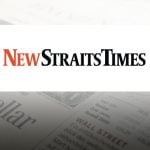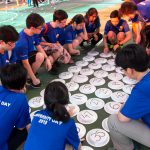SEAMEO RECFON and the Centre for Transformative Nutrition and Health of the International Medical University (IMU) of Malaysia in collaboration with the South East Asian Nutrition Leadership Program (SEANLP) Alumni conducted webinar series themed Asian Diets in Combating Non Communicable Diseases on 21 July 2021, and Dietary Patterns and Disease Prevention – Multi Country Experience on 21 October 2021. The webinars targeted nutrition and health professionals, academia, researchers, programme implementers, school communities and other related professions in the Southeast Asian region and beyond. During the opening programme, RECFON Director Prof Muchtaruddin Mansyur welcomed the participants for joining the first webinar session. He acknowledged the recent studies on the changes in food consumption patterns and dietary habits of adults, and their effect on nutritional and health related problems such as obesity, diabetes, coronary heart diseases, etc. in Southeast Asia. “These problems are attributed to the rapid urbanisation, increased household incomes, and greater dependence on processed food or eating out. This nutrition transition involves the change from a traditional or agro-based, to a more ‘westernised’ or global diet and lifestyle”, he added. Dr Yang Wai Yew, the Head of Division from IMU echoed the importance of disseminating latest global evidence on diet and diseases using scientific forum in her welcoming speech during Session 2. The first webinar presented Dr Helda Khusun (SEAMEO RECFON/ SEANLP Alumni) who spoke about Emerging Dietary Pattern of Indonesians, Prof Norimah A Karim (IMU/ SEANLP Alumni) on Dietary Pattern Transition in Malaysia: Are we heading in the right direction? and Prof Jeyakumar Henry (Singapore Institute of Food and Biotechnology Innovation (SIFBI) on Is Nutrition in a Cul-de-sac: Will modern food technology be its salvation?
| 3-minute theses | |
|---|---|
| Doctorate student, Mugambikai Magendiran (Universiti Putra Malaysia) | Dietary Pattern and Cardiometabolic Risk Factors in Malaysian Young People |
| Doctorate student, Dini Ririn Andrias (Universitas Indonesia/SEANLP Alumni) | Development of Food Based Recommendations for Children aged 12-23 months in Food Insecure Areas in Indonesia respectively. |
This session was moderated by A/Prof Mahenderan Appukutty (UiTM/ SEANLP Alumni). Dr Helda and Prof Norimah highlighted that transitioning of the food consumption in Indonesia and Malaysia are characterised with more spending on processed and ready-to-eat foods, lower carbohydrate and higher fat contribution to the total calorie intake, higher animal protein consumption in urban and higher wealth index, higher consumption of fritters, sweet and salty foods also sugar sweetened beverages, and low consumption of fruit and vegetables. In addition, a collective understanding emerged around the need of universal food and nutrition policies that embrace subsidies (for healthier food items) and taxations (for less healthier foods) for ensuring pro-health food environments. Prof Jeya proposed an integration of collective Southeast Asian expertise to form an internationally recognised forum in food and nutrition that combines biology, behavior, and food sciences for improving the health and well-being of millions in the region. The first webinar session successfully attracted 145 participants from Brunei, India, Indonesia, Malaysia, Singapore, Thailand, Vietnam, and Yemen. The recorded session of the webinar was uploaded at SEAMEO RECFON’s YouTube Channel and has drawn interests of 903 viewers based on our record on 23 November 2021. The second webinar: “Dietary Patterns and Disease Prevention – Multi Country Experience” eschewed the reductionist approach of viewing single foods or nutrients and their link to diseases. This minimalistic approach ignores the complex interactions of the foods that go into making diets. To address these concerns, methods in nutritional epidemiology have evolved to evaluate diets holistically and qualitatively by studying dietary patterns. This webinar examined the perspectives from Australia, Indonesia, and United Kingdom on what and how to eat to prevent diseases.
| Three Speakers |
|---|
| Laureate Prof Clare Collins (University of Newcastle, Australia) |
| Dr Umi Fahida (SEAMEO RECFON/ SEANLP Alumni) |
| Prof Janet Cade (University of Leeds, United Kingdom) |
The webinar also presented two doctoral students Dr Nik Nur Izzati (Universiti Kebangsaan Malaysia) and Dr Witri Ardini (Universiti Indonesia). This session was moderated by Prof Dr Norimah Abdul Karim (IMU/ SEANLP Alumni).
The first speaker in this webinar, Prof Collins the speaker discussed on the role of dietary patterns in body weight management among children. Prof Collins reviewed the literature systematically for the effect of improving diet quality and its implication on body weight management in children. She emphasised the need for providing specific evidenced food-based guidelines such as improving fruit and vegetable intake in weight loss interventions and the need to evaluate the effectiveness of interventions using validated tools and measurements. The second presenter Dr Umi Fahida shared on the use of linear programming to optimise food-based recommendation for disease prevention. Dr Umi Fahida spoke about how certain changes such as increase in dark green leafy vegetable and fish intake are easier than reducing fried foods in the Indonesian context. Prof Janet Cade who presented next unlocked the existing evidence on whether diet can prevent cancer. She identified limitations in existing evidence linking diet and disease and the use of new technologies to improve study design and data quality.
| 3-minute presentation | |
|---|---|
| Dr Nik Nur Izzati | Presentation: “Successful agers in Malaysia: What do they eat?” |
| Dr Witri Ardini | Presentation: “Effect of variation in taste receptor genes on macronutrient intake: studies on TAS1R2 rs35874116 and TAS2R38 rs713598 in Indonesian population” |
The second webinar session successfully attracted over 300 participants from ASEAN countries, Europe and the Middle East. The recorded session of the webinar was uploaded at IMU’s YouTube Channel and has drawn interests of 39 viewers based within a month of the webinar.









